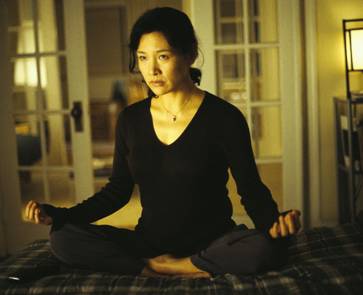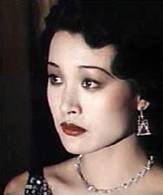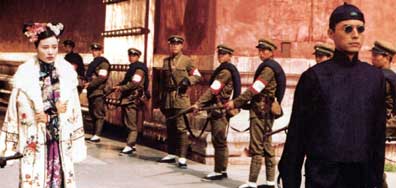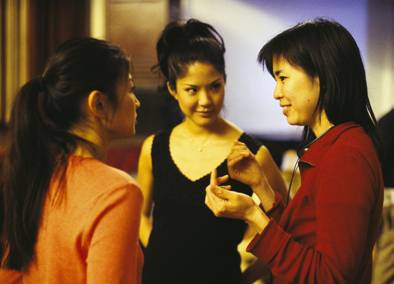Jan
The language issue is interesting, Alice. On the one hand, Wil’s mother “Ma” (played by Chen) only speaks a couple of little words in English, and yet the name that she gives her daughter is “Wilhemina.” Why doesn’t Ma speak more of her dialogue in English?
Alice
She just chooses not to. On some level she doesn’t have to, because she lives in this Chinese-American enclave [in Flushing]. I grew up in Northern California, also in an insular community, & my Mom speaks wonderful English. But if she had her choice, she wouldn’t speak English at all. She loves to speak Mandarin.
Part of my point is that many Chinese people don’t want to become totally “American.” Certainly Wil’s grandfather (Wai Gung) makes it very clear that he thinks being Western, well, there’s something sinful about that. As for Ma, she works in a beauty salon [in Flushing]. She doesn’t have to speak English at work, and she lives at home with her parents. What would her impetus be to learn English?
Jan
But she clearly understands English, because that’s what Wil typically speaks. So why does she only speak Mandarin, for example with Wil’s African-American neighbor Jay? Is she deliberately excluding him from the conversation?
Alice
Right, Ma uses language to her advantage. She can choose to suddenly not understand if she doesn’t want to.
Joan
There are a lot of Chinese people who’ve been here in the States forever who don’t speak English. They understand a lot because they hear it, but they’re not able to speak. I’ve had two nannies, and they were like that. They would tell me when the school teacher called and they understood what she said, but they wouldn’t speak English and they were not able to really formulate sentences.
Jan
It took me awhile to figure out Ma’s name. Why don’t you call her by her name: Hwei Lan?
Alice
Ma has a Chinese name, Hwei Lan, but I just figured, why people put through the torture?
Joan
Everybody calls her “Ma.”
Alice
Jan, if you call her “Hwei Lan,” people will wonder: “Who the hell is that?”
Jan
Is that what you want, Alice?
Alice
For the story? Yeah, it’s fine. I don’t want people to be distanced [by the language]. If anything, I want to be “quietly subversive.” I want people to be folded in, to feel like this is their family. The moment you tell people: “I’m educating you…” Talk about driving people away from the theater!
Many different people have told me they came into my film and had a wonderful experience, and it was very personal to them. They’re not Chinese or gay or anything, and I think that’s highly unusual. You can take a group of people that seems so specific, and make them universally human.
Everyone has a mother, and I never refer to Ma as “Hwei Lan” because the daughter’s obviously not going to call her mother by her real name.
Jan
So you’ve made a strategic decision here? Deliberately calling Hwei Lan “Ma” helps make it clear to the audience that this is primarily Wil’s story?
Joan
It’s from the daughter’s point of view. It’s the American daughter’s point of view. If it was a Chinese mother’s point of view, the film would have had a different perspective. It would have been a different film.
Alice
Right.
Jan
Mmmm... I think you’re selling yourself short, Alice. I think you’ve created two wonderful women with independent points of view.
Alice
Really? I think most people will identify more with Wil, like: ”Oh my God, what would happen if my mom got pregnant and moved in with me?” They’re less thinking: “What would happen if I got pregnant and moved in with my daughter?”
Jan
(laughing)
Joan, do you think maybe there’s a difference in perspective here? I’m certainly closer in age to you; I’m probably even older than you. I know for sure that I’m older now than Hwei Lan is in the film!
Joan
Possibly. I’m flattered that you feel so close to Ma, that you loved her story so much.
Jan
I did. I loved both characters. I thought both points of view, Wil’s and Ma’s, were quite well-balanced. Both of them have their secrets, from each other and from us [in the audience].
Alice
But wait, when you were watching it, were you thinking: ”What if I got pregnant and moved in with my daughter?”
Jan
Gosh, no, Alice. I was thinking: “Isn’t it wonderful to see a movie confront the idea that a woman is too old for love at 48!” There are so few parts today that represent middle-aged women as beautiful and desirable. Watching you reveal her secrets was just a delight! We don’t want to give too much away, but you tease us for a really long time before telling us who fathered Hwei Lan’s baby.
Alice
I think this is fascinating. I’ve never been asked about this before.

Finding herself pregnant & unmarried at age 48,
Wil’s mother Hwei Lan (Joan Chen) contemplates her options.
Jan
So let’s keep going! Joan, talk a little bit about how you developed Ma’s character?
Joan
I remember when I was doing THE LAST
EMPEROR: I was 25 going on 26, and I had to play the Empress Wan Jung. She’s about to die at the end, and when Bernardo [director Bernardo Bertolucci] put me in a pair of shoes that were two sizes too big, I started to walk like that, you know. The shoes didn’t fit! Somehow, when I looked into the mirror, I assumed that posture. Same with Ma, it sounds so insignificant, but the costume choices and hairdos help me; I look in the mirror and I feel that way.


Joan Chen as “Empress Wan Jung” in THE LAST EMPEROR (1987).
Jan
Did you choose Ma’s costumes yourself, Alice?
Alice
Pretty much. Joan is so glamorous and sexy that she would never choose to wear what Ma wears in the beginning of the film, not in a million years!
Joan
In the beginning, I thought: “Oh my God, look at these clothes!” But the costume designer, Jill Newell, was wonderful. She stopped all the middle-aged women in Chinatown, and she found a tone for Ma.
Alice
We actually got Ma’s aprons from the woman who plays Ma’s mother (Wai Po) in the film. Those were Guang Lan Koh’s real aprons.
Jan
Tell me more about the scene where Ma is deciding what to wear on her first date.
Alice
Ma has a closet full of dresses that she’s bought for herself through the years.
Joan
She doesn’t wear them, but she still has them, to see them; she still has dreams.
Alice
All of these dresses, they all still have tags on them. That’s really important. I said to the prop master: “I need dresses and they must have tags when we see them.”
These are dresses that, through the 20 years that Ma has been a widow, she’s just stuffed under them her bed. She has all this colorful clothing. So when Ma rejects one dress because “Chinese people can’t wear yellow,” well, the funny thing is
she bought that dress!
Joan
I think we all do that. Before I go out my bedroom is a mess. Even today, you know, trying this on, trying that. I’m settled. I’m married with kids. But I still do that; I think most women do that.
Jan
Were you also alluding in that scene to the kinds of shopping trips they must have had together, when Wil was a kid? Ma complains about Wil’s outfit in their very first scene together. Isn’t Wai Po, Ma’s mother, making fun of both of them in that scene when she says: “Oh, that’s just what we wore during the Revolution.”
Alice
Absolutely! You know what, here’s the thing: Ma works in a beauty salon as aesthetician. She’s right in the thick of downtown Flushing [in New York City, in the borough of Queens], and these are the dresses she’s picked up over the years on her lunch break, secretly.
Joan
I think Ma daydreams when she shops, you know, because she’s not been happy… When I was reading the script, I was really delighted that this woman had so much in her. In the beginning, she appears to be like over, completely over, and it’s wonderful when it turns out she has so much in her.
Jan
It IS wonderful. There’s a great deal going on below the surface, so many little details, all very subtle. That’s what makes
SAVING FACE so much fun to watch, the second time just as much as the first time.
Let me end by asking about the music. In the beginning, over the opening credits, the music sounds almost Italian. I didn’t expect that, because I knew the film was about Asian-Americans. What were you thinking, Alice? Did you want to emphasis the “urban” quality of Wil’s life?
Alice
I love Nino Rota [the Italian film composer who wrote classics like the theme to Fellini’s
AMARCORD]. I also love Argentinean tango. When I was interviewing composers, anytime someone’s approach was too “Chinese traditional,” I crossed them off the list.
I didn’t’ want to do some weird fetishistic Chinese thing. Personally, I love the accordion; I love strings. In a way,
SAVING FACE is an old-fashioned screwball romantic comedy. And it’s set in New York City, which is drenchingly romantic if you shoot it right. The music Anton Sanko wrote for me should make anyone from any culture feel like there’s a sense of whimsy and playfulness and romance to this film.
The tango is about repression. There’s a lot of reserve, and yet it’s incredibly passionate, which is just what I wanted. Ma is incredibly passionate, and yet so much is held back. Wil is too, and that’s what this film is about, right?

Director Alice Wu (far right) sets up a romantic dance number
for Wil & her lover Vivian (Lynn Chen, in black).
© Jan Lisa Huttner (5/28/05)
Final FF2 Notes:
Stills from SAVING FACE are courtesy
of
Sony Pictures Classics (photo credit: JoJo Whilden).
Stills from THE LAST EMPEROR are courtesy of Columbia Pictures.
Thanks go to Jeff Marden of Hess Newmark Owens Wolf
for setting up this opportunity.
